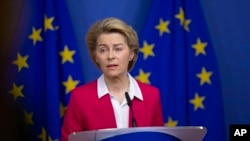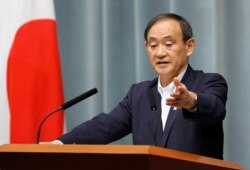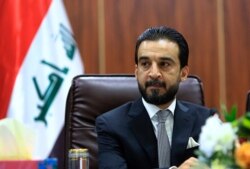Governments and organizations are urging the United States and Iran to take steps to de-escalate tensions after a series of attacks on each other's interests in Iraq.
"The current crisis deeply affects not only the region, but all of us, and the use of weapons must stop now to give space to dialogue," said EU Commission President Ursula von der Leyen. "We all are called upon to do everything possible to rekindle talks and there cannot be enough of that."
British Foreign Secretary Dominic Raab on Wednesday condemned Iran's missile attacks on two Iraqi air bases that house U.S. and coalition forces, including British troops.
"We urge Iran not to repeat these reckless and dangerous attacks, and instead to pursue urgent de-escalation," Raab said.
He added that a war in the region would only help Islamic State, the militant group at the center of the coalition's mission in Iraq.
British Prime Minister Boris Johnson told parliament the 2015 nuclear deal between Iran and six world powers is still the best plan to prevent Iran from developing a nuclear weapon, despite Iran's Sunday announcement that it would no longer comply with the agreement's restrictions on its nuclear program.
"It is our view that the JCPOA (Joint Comprehensive Plan of Action) remains the best way of preventing nuclear proliferation in Iran," Johnson said.
In China, foreign ministry spokesman Geng Shuang said the parties involved should exercise restraint, and that China urges dialogue and other peaceful steps to protect peace and stability in the region.
Japan's Chief Cabinet spokesman Yoshihide Suga expressed concern about the situation in the Middle East, and called for all nations involved to exert whatever diplomatic effort they can to improve relations.
Israeli Prime Minister Benjamin Netanyahu vowed a massive military response to any adversary who attacks his country as regional tensions continue to escalate.
"We stand strongly against our enemies," Netanyahu said. "We stand committed and strong. Whoever wants to attack us will suffer a very devastating blow."
United Arab Emirates Minister of State for Foreign Affairs Anwar Gargash tweeted it is essential for the region to pull back from what he called "current and troubling tensions."
"De-escalation is both wise & necessary. A political path towards stability must follow," Gargash wrote.
During emergency talks with NATO members in Brussels, Secretary-General Jens Stoltenberg denounced the Iranian missile attacks and called on Iran to "refrain from further violence." He added, "A new conflict would be in no one's interest."
Also condemning Iran's missile strikes is Iraqi Parliament Speaker Mohamed al-Halbousi, who declared they were a "violation of Iraqi sovereignty."
Halbusi called for urgent action to prevent foreign powers from using Iraq as a proxy battlefield, saying "we confirm our absolute refusal to the conflicting parties to use the Iraqi arena to settle scores."
After urging de-escalation in an early Wednesday conversation with U.S. Secretary of State Mike Pompeo, the prime minister of Iraq's sovereign Kurdish region, Masrour Barzani, said in a statement the area must not be transformed into "a field of conflict."
Canada and Spain said they would withdraw some troops from Iraq for safety reasons. The two countries made the announcements hours after NATO announced it would move some of its military trainers out of Iraq, without offering details.








